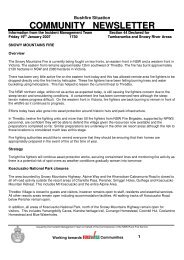COMMUNITY HEALTH DATES TO REMEMBER ... - Platypus Country
COMMUNITY HEALTH DATES TO REMEMBER ... - Platypus Country
COMMUNITY HEALTH DATES TO REMEMBER ... - Platypus Country
You also want an ePaper? Increase the reach of your titles
YUMPU automatically turns print PDFs into web optimized ePapers that Google loves.
You are not aloneThe Age July 23, 2012Michael ShortThe Australia Institute recently published a report calledAll the Lonely People (obviously a Beatles fan was itsauthor).''If you have been lonely for three years, it is likely toextend for a long period of time. So yes, transitioning inand out is something that appears to be part of theexperience of life and is certainly going to be informed byevents in your life that you're not always going to havecontrol of. But once you find that you are entrenched orstuck in that experience, then that's where it is going tobecome a really important social issue.''In the report we cite a definition of loneliness that it isthe mismatch between the relationships that we desire orwish we had and the reality we are currently living. So forall people the experience or threshold for loneliness isgoing to be different, but for everyone it is a matter ofrelational voids in our lives.''Some of the key findings of All the lonely people are:■This risk of loneliness is greater for couples living withchildren than for childless couples. Baker speculates thisreflects the amount of time, energy and money it takes toraise a family.■People living alone or in single-parent households aretwice as likely to be lonely as people living in couples.■There is no difference in loneliness levels in cities andrural areas.■Young women who are on low incomes are the mostlikely group to be lonely.■Once people reach a minimal level of financial security,rates of loneliness are not affected by wealth.■For both men and women, increased financialdifficulties are related to becoming lonely.■During the 10 years to 2010, more men (36 per cent)were lonely than women (29 per cent). Baker believesthis is because women tend to nurture stronger socialnetworks. ''It is cliched, but men do not reach out to othermen.''■The prevalence of loneliness increases for men untilthe age of 60, but then declines.■For people aged 25 to 44, men are four times as likelyas women to live alone, and are twice as likely to belonely.■The role of social media is not straightforward. Somelonely people seem to be seeking social support throughnetworking sites, but do not consider such contacts realfriends, while those who are not lonely are using thesites to expand already robust social circles.Baker argues there are some policy implications forgovernments, particularly the need to provide support forpeople who leave hospital and have no family or friendsto help with the transition back to their normal life.''If you don't have that social structure, and the state isno longer providing sufficient resources, then there is abig issue there.'' Policies that promote employment arealso crucial, he says.But connecting to the community is the most accessibleway to combat loneliness. There are so manyopportunities to engage with people, places, issues andideas; Australia has more than 600,000 not-for-profitorganisations, employing one in 12 of the workforce andwelcoming as many as 6.4 million volunteers.Health NewsThere is, however, a paradox.''Our research found though that people who areexperiencing loneliness are less likely to volunteer, so thatthe option of using volunteering to help people who arelonely becomes more difficult because they are alreadymore hesitant to participate in volunteering.''Perhaps another ready solution lies right next door;connecting with your neighbourhood. These days,dropping in unexpectedly on family and friends hasbecome almost a faux pas, which probably reflects thedemands of juggling work and the afore-mentionedrealities of raising a family.But, given the persistence and prevalence of loneliness,surely it's time to question the wisdom of such hesitancy.Turning up unannounced might provoke offence ordiscomfort, so maybe it's not smart to just start barging inon people, but it would seem a decent idea to arrange,even at short notice, a bigger number of informal visits tofriends and family and neighbours.And, of course, we can circumvent the dropping-in issue byinviting people to our homes or some other venue. Thismight all sound rather evident, but it does not seem to behappening as much as it might.Almost all of us have been, or are, lonely or knowsomeone who is in need of, or even desperate for,company. How common, indeed, is the lament: ''I reallymust get around to catching up with X.'' Sometimes themost ingrained problems have simple solutions.Let's just make the effort and share the rewards.Read more: http://www.theage.com.au/national/you-arenot--alone-20120722-22i3d.html#ixzz21hXMR3fCEngaging with one's communityhas health benefits25.07.12There is strong evidence of the relationship between socialisolation and health. Older people who are socially isolatedare more likely to have poorer health in general, whileisolated adolescents are more likely to experience mentalhealth issues, show depressive symptoms and have lowerself-esteem.I would like to suggest that any readers feeling vulnerableas a result of social isolation should try to re-engage withtheir communities in ways that have been proven to haveboth mental and physical health benefits.Arts and cultural activities create opportunities for peopleto expand their social networks and to develop newfriendships, which can provide social support and impactpositively on health.Another way to engage socially is through activeparticipation in physical activity, which also has hugemental health benefits and is known to reduce depression,stress and anxiety, and improve self-confidence, selfesteem,energy levels, sleep quality and the ability toconcentrate.Participation in arts or physical activities are just two wayspeople can use to improve their mental health. There aremany others.One of the best things people can do when it comes tosocial isolation is to speak to someone about it.Jerril Rechter—Chief Executive OfficerVicHealth (Victorian Health Promotion Foundation)
















